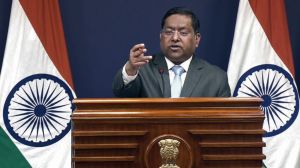The enemy is self-doubt
India's nuclear weapon-state status has not only generated critical reactions abroad, a sharp division on its decision to go morally nuclear...

India8217;s nuclear weapon-state status has not only generated critical reactions abroad, a sharp division on its decision to go morally nuclear marks Indian public opinion too. India has to cope with the hypocrisy of the nuclear-weapon powers and their moral posturing while dealing with the contradiction between the moral irrelevance of becoming a nuclear power and the requirements of national security. Managing these contradictions is the overarching challenge of domestic and foreign policies.
Let me reproduce two statements which embody these contradictions. quot;Every man, woman and child lives under a nuclear sword of Democles hanging by the slenderest of threads capable of being cut at any moment by accident, miscalculation or madness.quot; The second: quot;But until mankind has abolished both war and its instruments of destruction, the United States must maintain an effective quantity and quality of nuclear weapons so deployed and protected as to be capable of surviving any surprise attack and devastating theattacker. Only through such strength can we be certain of deterring a nuclear strike or an overwhelming ground attack upon our forces 8230;Only through such strength can we in the free world should that deterrent fail face the tragedy of another war with any hope of survival.quot;
The first defines the moral dilemma and argues for the elimination of weapons of mass destruction. The second articulates the rationale for deterrence. Both were made by President John F. Kennedy, the first in his UN speech of September 25, 1961, the second in a speech explaining his decision to resume American nuclear tests in 1962.
No one would argue against abjuring nuclear weapons in maximalist normative terms. It is in the context of existential realities that the criticisms of weaponisation must be evaluated: Acquisition of these weapons goes against India8217;s moral and humanistic traditions. India has lost the high moral ground from which to argue for disarmament. It does not strengthen security but increases security threats,in Kashmir, and from China and Pakistan. Acquisition and deployment will profoundly affect India8217;s economic needs. Acquiring the weapons and perfecting delivery systems is only the beginning of this no-win game. The follow-up will be technologically complex and costly. The BJP took the decision for purely partisan reasons.
The first criticism is valid in absolute terms, but absolute logic does not govern international relations. The deciding factor remains military and economic power based on political will and technological capacity. We retained our moral high ground for nearly 35 years. This did not reduce our security threats. It brought more pressure to stifle our defence and even technological capacities for peaceful purposes. The acquisition of these weapons does not mean India has resiled from its humanistic traditions. It has only acquired a preemptive capacity to safeguard its interests in an unjust world order. It still argues for the elimination of such weapons in a definite timeframe. Thecriticism that nuclear weaponisation has increased security threats is debatable. The security threats and nuclear posturing of two of our neighbours and other nuclear-weapon powers have shown an incremental pattern. Acquiring credible deterrence is not adventurist or futile. Continued ambiguity would have increased our vulnerability. Would Pakistan and China or other nuclear-weapon states have abandoned their nuclear policies had we not tested? The answer is a resounding No8217;.
True, weaponisation will have some negative economic impact. India8217;s territorial integrity cannot be ensured free of cost. The will to survive with dignity and self-reliance requires a tightening of belts. The consequences will in no way be unmanageable except for those who think economic well-being can be achieved without ensuring national security.The argument about follow-up action being technologically complex and too costly is spurious. The government must have taken follow-up into account when deciding to go public about ournuclear-weapons capacity. Of course it will be costly, but our technological capacities need not be doubted.
The point about the decision being for partisan BJP purposes is itself a partisan argument. The tests were the culmination of nearly 24 years of preparatory work. If weaponisation is valid, the credit goes collectively to previous and the present governments. If it is wrong, the guilt is shared by the parties which were in power in the last two and a half decades.
Ambiguity beyond 1999 would have been counter-productive and smacked of political hypocrisy. It would have left us technologically unprepared to face security threats at the threshold we have reached since the finalisation of the CTBT. The thought occurs to me that our internal divisions and self-torturing doubts are more dangerous to our security than external pressures or sanctions.
The G-8 meeting in Birmingham and the P-5 foreign ministers8217; meeting in Geneva betray the realisation that selective non-proliferation measures cannotsucceed. India and Pakistan8217;s de facto position has been acknowledged. The nuclear-weapon states wish their non-proliferation agenda to progress. But they are also grappling with India and Pakistan8217;s weapons status and its possible ripple effect on horizontal proliferation.
Both P-5 and Security Council meetings in early June reactivated their concern about Kashmir. We must understand that the anxiety is not so much to solve the Kashmir issue as to ensure that it does not become a nuclear flashpoint. We must be alert about Pakistan encouraging this concern to the hilt. Brajesh Mishra8217;s discussions with French, British and Russian leaders have been useful in conveying our sense of responsibility and discipline and in persuading them to take a more realistic view of India and even Pakistan. Similar contacts with the Chinese and American leadership are essential.
We must remain firm about our stand on Kashmir vis-a-vis the UN and other pressures without being confrontationist. Atalji will doubtless follow uphis overtures to Pakistan at his meeting with Nawaz Sharif at the Colombo SAARC summit in July. We must restructure the style and content of our dialogue with Pakistan. This is the only way to cope with the inevitable contradictions generated by the subcontinental tests. The focus should now be on answering the question about where we proceed from here.
- 01
- 02
- 03
- 04
- 05































